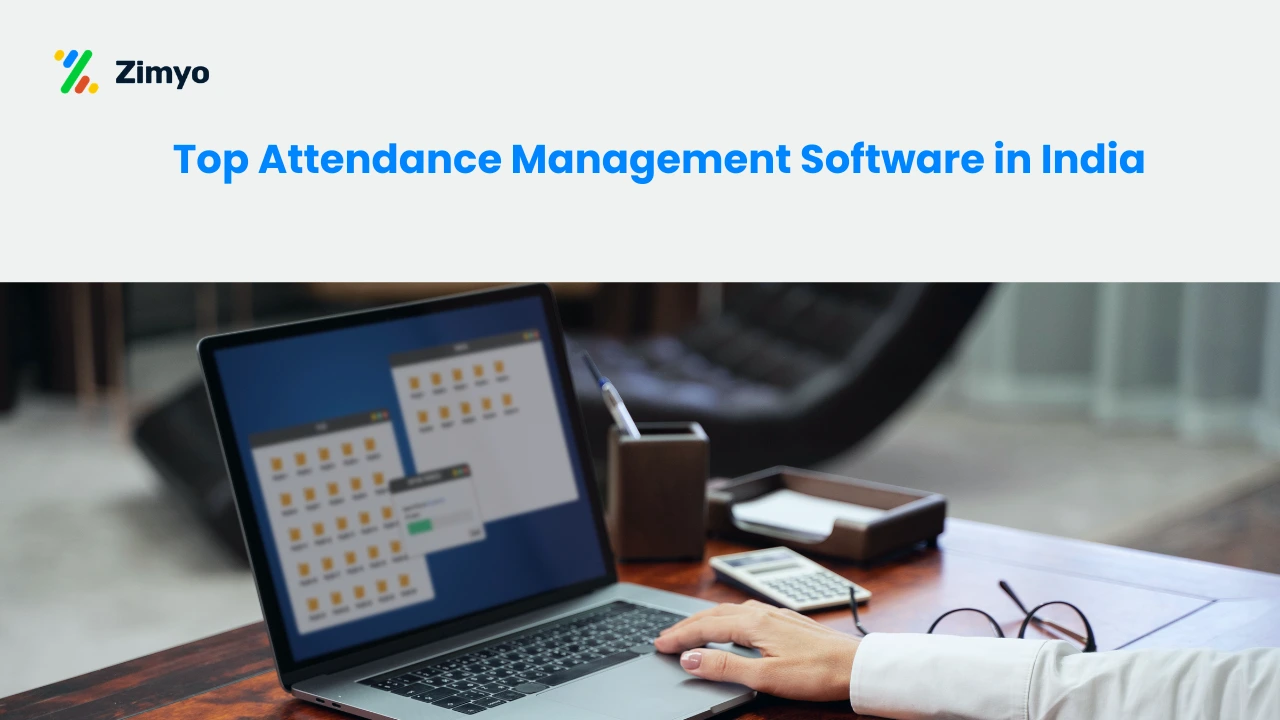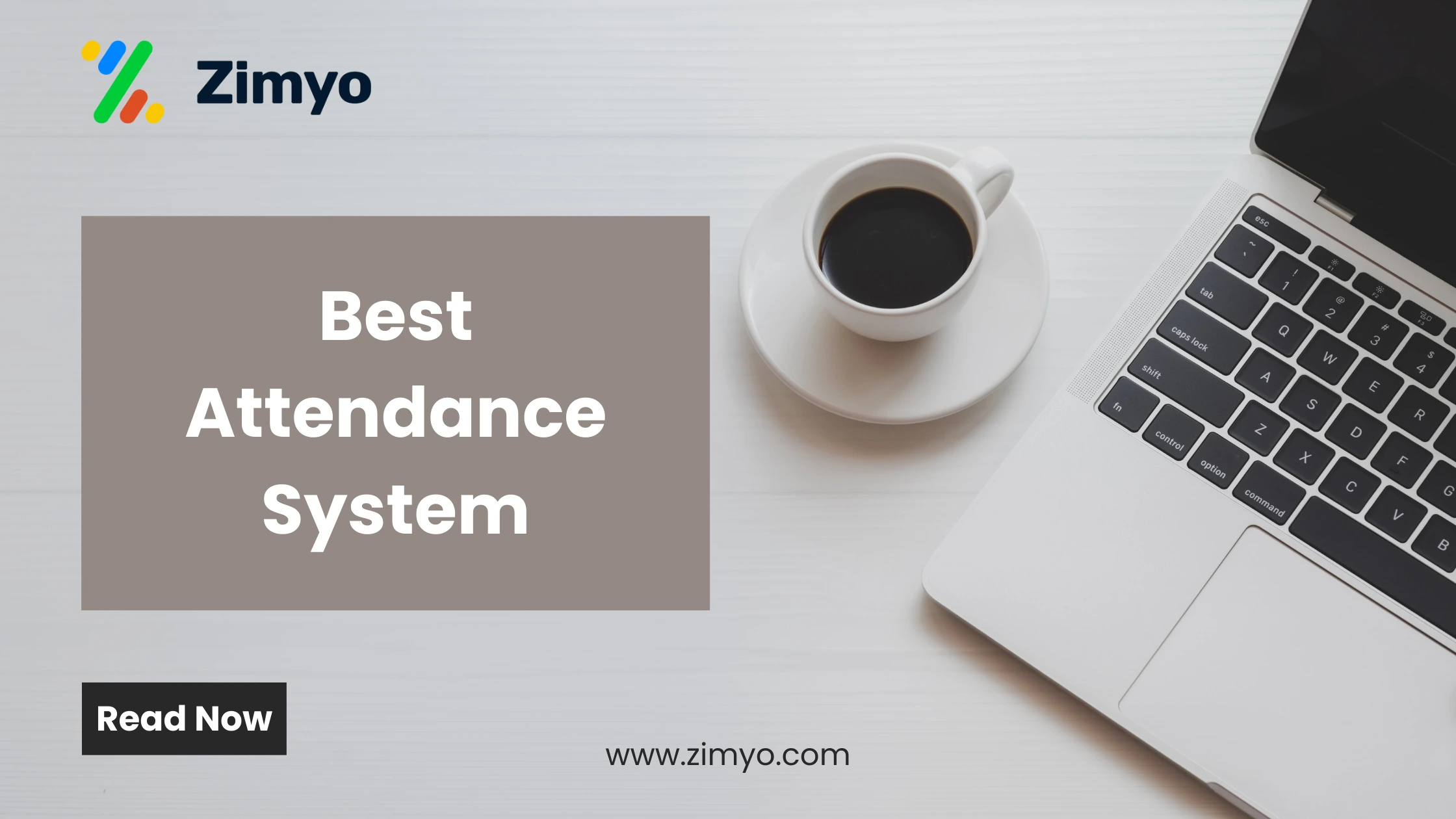Attendance management in an organization is no longer as straightforward as checking names on a register. With large teams, remote working, hybrid setups, and flexible shifts, manual tracking is often associated with inaccuracies, compliance problems, and productivity losses. This is where attendance management kicks in.
An attendance system makes it computerized to track when staff members clock in, clock out, go on breaks, or work overtime. Rather than just being a tick-box for presence, attendance software of today integrates with payroll, HRMS, and workforce management to catch each minute of work accurately.
In this blog, we’ll go in-depth into what attendance management software is, why businesses require it, discuss the top 12 best attendance software, point out must-have features, and assist you in selecting the correct solution. Let’s begin.
What is Attendance Management Software?
Attendance management software is an electronic tool that monitors, records, and schedules the working hours of employees. It does away with manual input and minimizes human errors by automating the attendance with the help of biometric devices, geolocation check, RFID cards, or web/app-based systems.
Companies usually trust employee timesheet software to monitor productivity and maintain compliance with labor regulations. But attendance management now goes one step higher, it integrates straightway with HRMS, payroll applications, and performance tracking.
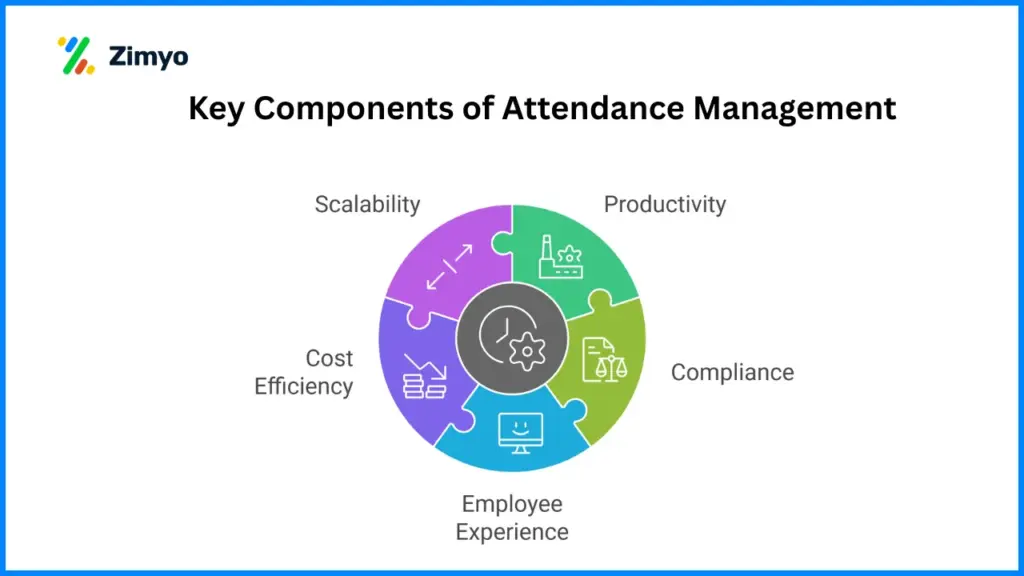
Simply put, enterprise time attendance software guarantees:
- Precise working hours tracking
- Smooth integration with payroll
- Clear reporting and compliance
- Better workforce productivity
Top 12 Best Attendance Management Software for Enterprise
Whereas attendance management software is concerned, each enterprise has unique requirements—some require biometric integration, others focus on mobile tracking, payroll synchronization, or compliance. Below are the 12 top attendance software choices for enterprises, with an overview and pros & cons for each.
1. Zimyo
Zimyo is among the top attendance management solutions in India and worldwide. It offers an end-to-end solution for organizations with capabilities such as biometric integration, geo-fencing, facial recognition, and mobile check-ins for remote and hybrid teams. What sets Zimyo apart is its end-to-end HRMS attendance module, tightly integrated with payroll, performance, and compliance.
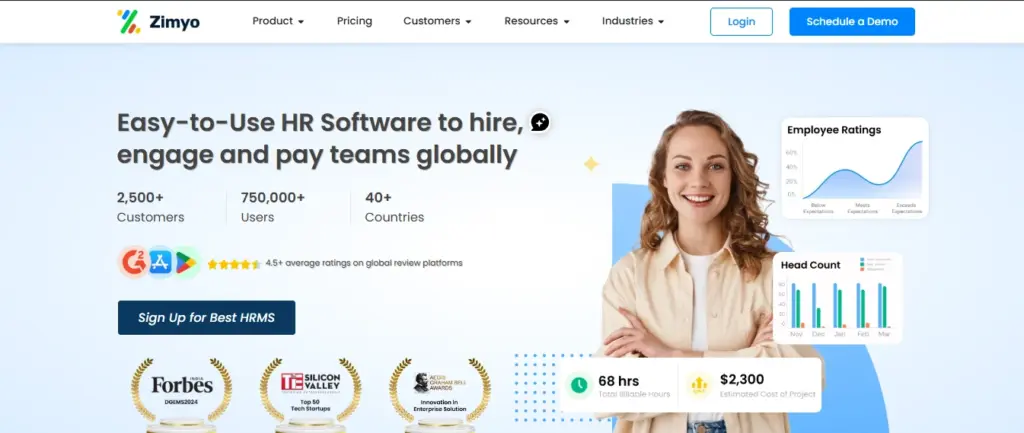
Key Features:
- Biometric, web, and mobile clock-ins
- Shift scheduling & overtime tracking
- Direct payroll integration
- Employee self-service portal
- Real-time reports and dashboards
Pros:
- All-in-one HRMS + payroll + attendance solution
- User-friendly interface
- Excellent support and customization options
- Scales well for enterprises
Cons:
- May be feature-heavy for very small businesses
- Requires setup time to explore full capabilities
2. Zoho People
Zoho People is a flexible cloud-based HR software that includes a reliable employee attendance management system. It’s especially popular among SMEs and enterprises that need affordable and customizable HR solutions.
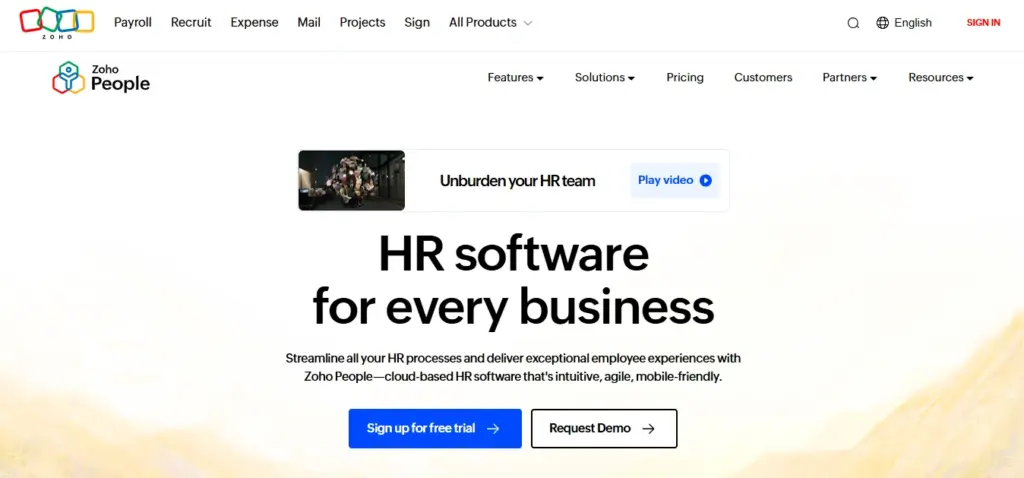
Key Features:
- Biometric integration & mobile clock-ins
- Timesheet and project tracking
- Customizable leave policies
- Integration with Zoho ecosystem
Pros:
- Affordable pricing
- Large HR feature set outside of attendance
- Ideal for growing teams
- Integration with other Zoho apps
Cons:
- Can be complex for first-time users
- Limited offline functionality
3. GreytHR
GreytHR is a popular attendance and payroll software in India, designed for compliance-heavy industries. It streamlines attendance, leave, and payroll while ensuring enterprises stay audit-ready.
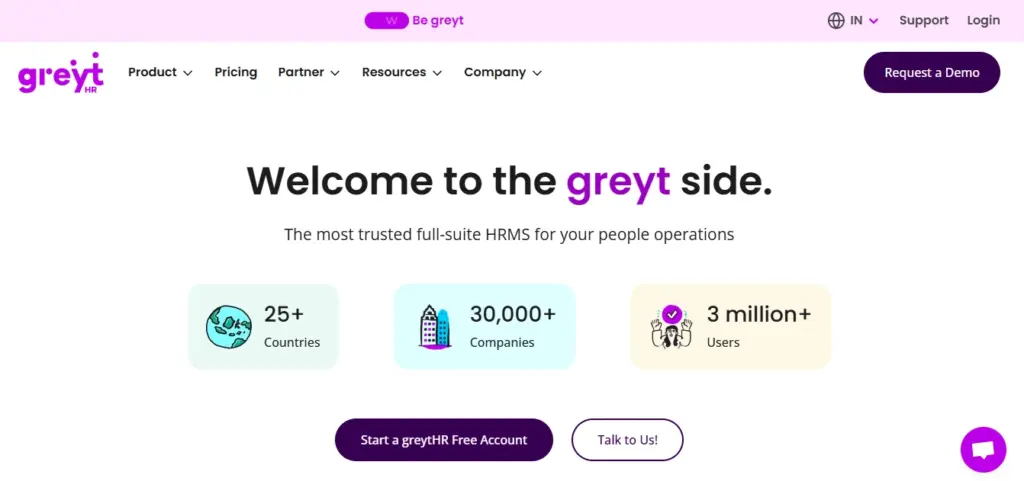
Key Features:
- Cloud-based attendance & leave management
- Auto-calculations of payroll from attendance
- Compliance reports & law books
- Employee self-service
Pros:
- Strongest payroll + attendance integration
- Compliance-friendly for Indian companies
- Strong reporting tools
Cons:
- Interface seems old in comparison to newer tools
- Restricted global support beyond India
4. Connecteam
Connecteam is built for remote and deskless teams. It’s mobile-first attendance software, allowing it to be simple for businesses that have employees in several locations.
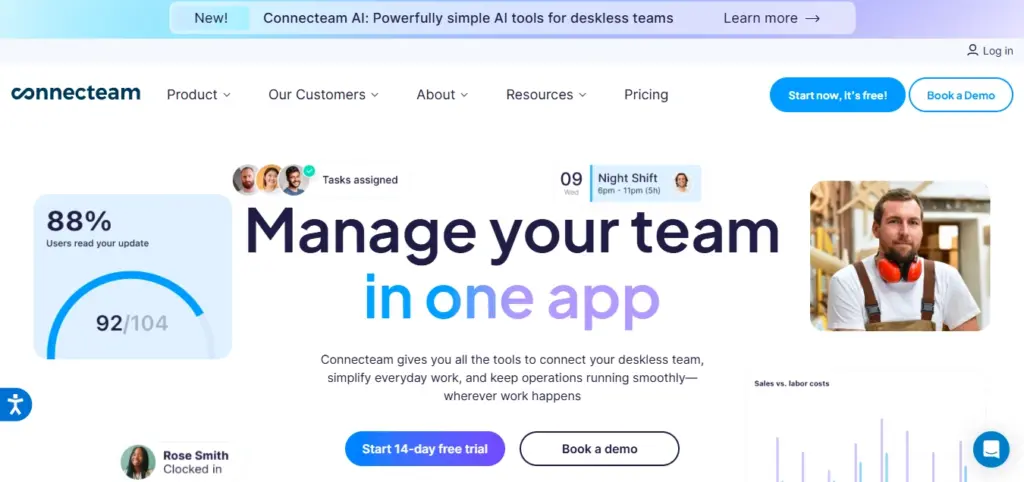
Key Features:
- GPS-based time tracking
- Mobile timesheets for projects
- Employee scheduling & communication
- Works great for field industries such as construction & retail
Pros:
- Ideal for mobile-first teams
- Simple-to-use interface
- Blends attendance + communication features
Cons:
- Limited desktop features
- Not ideal for enterprises with heavy compliance needs
5. HROne
HROne is an integrated HR software with all-in-one HRMS attendance coupled with payroll automation. It’s widely used for mid-to-large-scale Indian businesses.
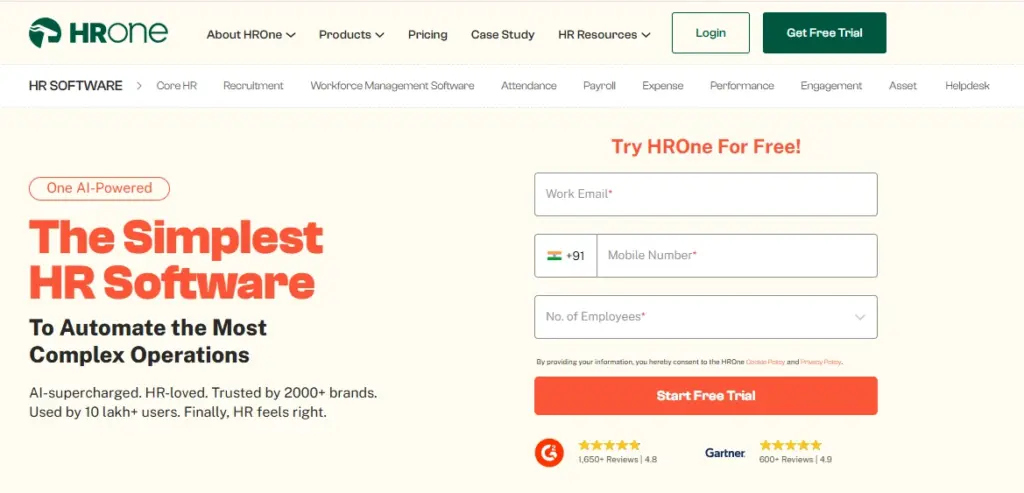
Key Features:
- Biometric & RFID device support
- Leave & overtime tracking
- Payroll and compliance automation
- Employee self-service
Pros:
- Unified HR + payroll + attendance platform
- Compliance-focused
- Intuitive dashboards
Cons:
- Learning curve for first-time users
- Some advanced features require higher plans
6. Timecheck
Timecheck is a dedicated enterprise time and attendance software that is best suited for large organizations with strict timekeeping and policy requirements.
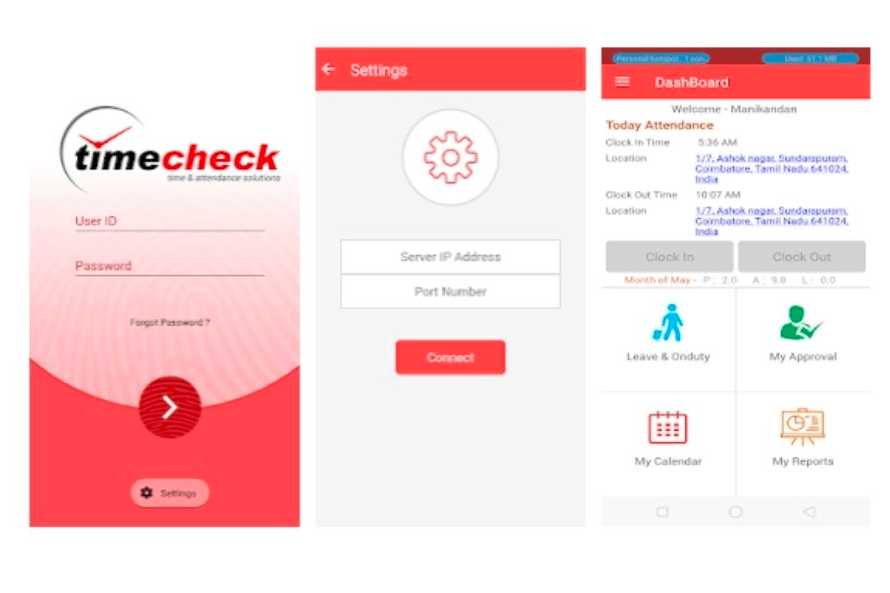
Key Features:
- Multi-location tracking
- Biometric & RFID support
- Customizable attendance policies
- Payroll-ready data export
Pros:
- Extremely customizable for businesses
- Heavy emphasis on compliance and precision
- Scales for large-scale deployments
Cons:
- Fewer HR features outside of attendance
- Tends to be technical for smaller HR departments
7. ADP
ADP is a worldwide leader in HR providing sophisticated attendance and payroll software. Its attendance solutions seamlessly integrate with its payroll and HR solutions.
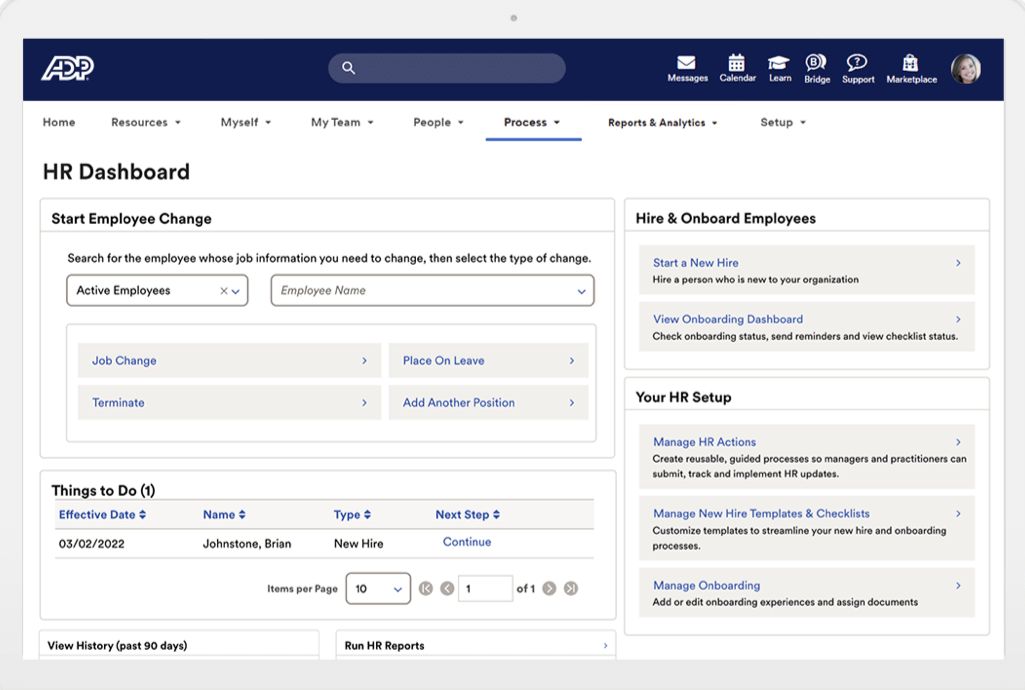
Key Features:
- Cloud-based time capture
- Multi-country regulations compliance
- Automated payroll & tax
- Sophisticated workforce analytics
Pros:
- Global presence & reliability
- Excellent compliance support
- Strong integration with ADP payroll
Cons:
- Expensive for small enterprises
- Features may be too advanced for mid-sized teams
8. Hubstaff
Hubstaff is ideal for remote and distributed teams, combining employee attendance management system features with productivity tracking.
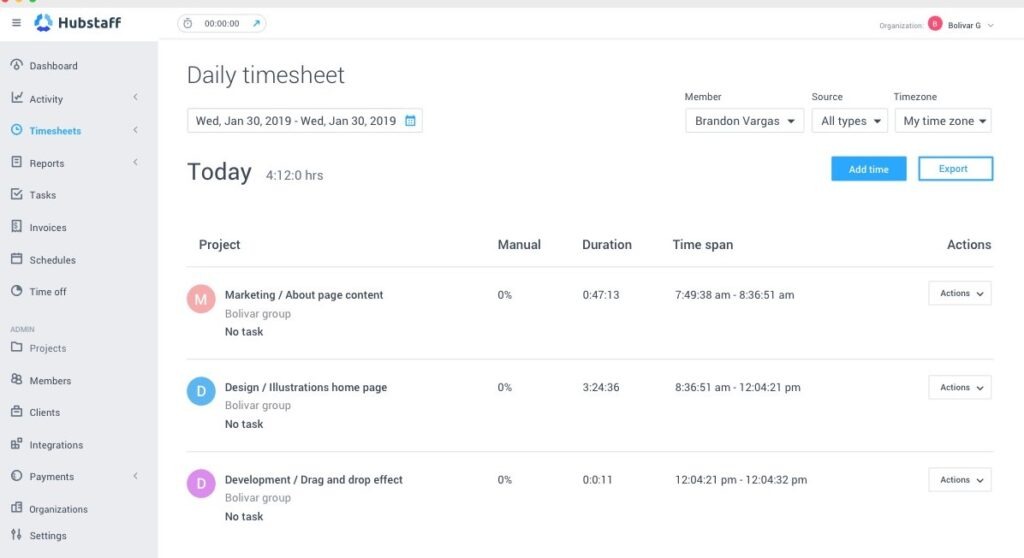
Key Features:
- Time tracking with screenshots
- GPS-based check-ins
- Payroll integration
- Productivity & activity reports
Pros:
- Great for remote/hybrid teams
- Useful productivity analytics
- Integrates with multiple tools (e.g., Trello, Asana)
Cons:
- May feel intrusive with screenshot monitoring
- Limited compliance features for enterprises
9. Clockify
Clockify is a widely used employee timesheet software that helps track hours across projects and teams. It’s free for unlimited users, making it a favorite for startups and enterprises alike.
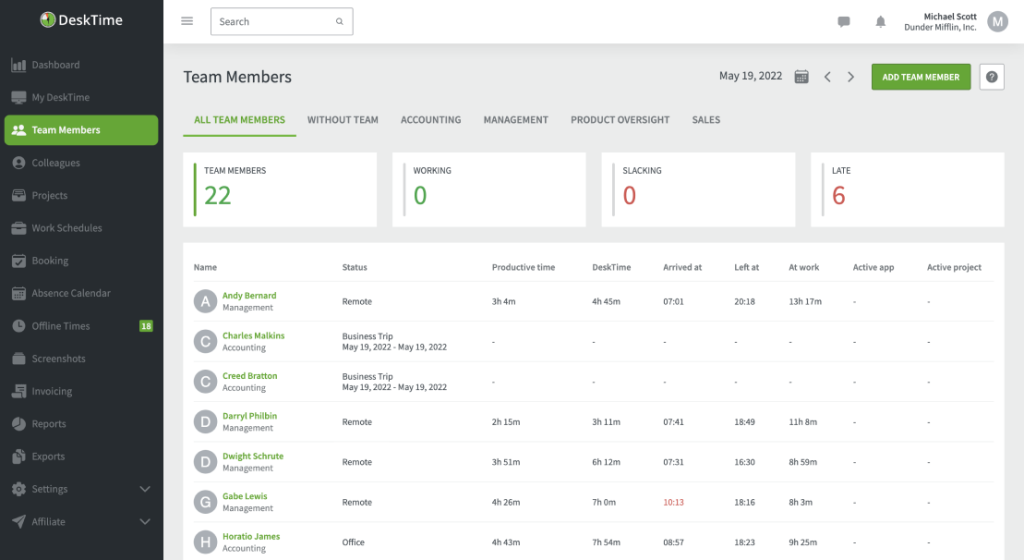
Key Features:
- Unlimited time tracking
- Project and task monitoring
- Attendance reports
- Payroll integration
Pros:
- Free version available
- Great for project-based time tracking
- User-friendly
Cons:
- Lacks advanced compliance features
- Limited automation compared to enterprise-grade tools
10. Buddy Punch
Buddy Punch is a straightforward and efficient attendance management software with a priority on simplicity. Employees can punch in from desktop or mobile, with geofencing and photo options.
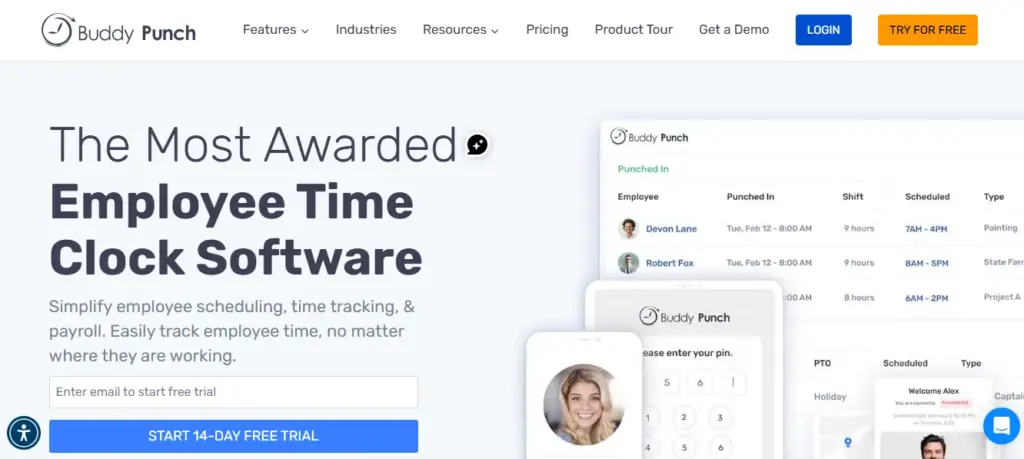
Key Features:
- Geofencing and webcam verification
- PTO and leave management
- Payroll-ready attendance reports
- Scheduling and shift planning
Pros:
- Very easy to set up and use
- Affordable for SMBs and enterprises
- Multiple clock-in methods
Cons:
- Limited HR features beyond attendance
- Some advanced reports require add-ons
11. QuickBooks Time (TSheets)
QuickBooks Time (formerly TSheets) is a tried-and-true option for businesses already running QuickBooks payroll and accounting. It excels at field and remote workforce payroll attendance software.
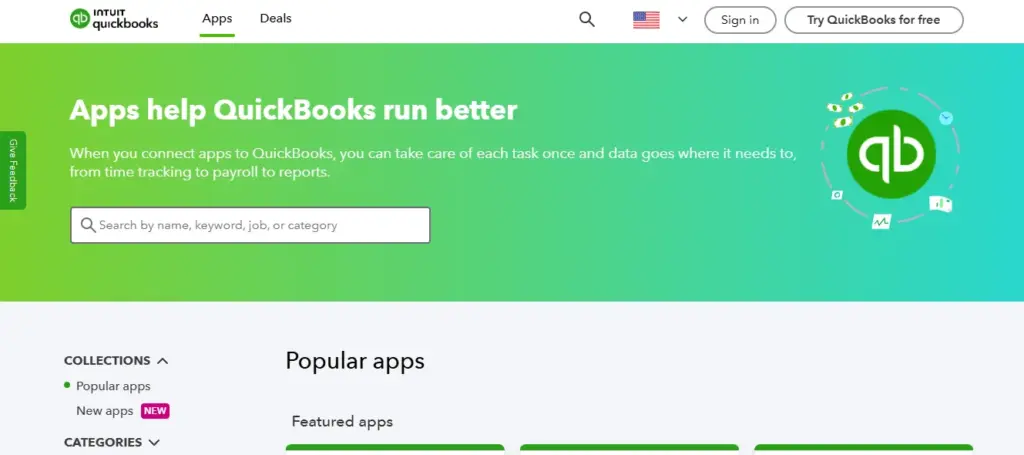
Key Features:
- Mobile attendance tracking
- GPS location tagging
- Timesheet approval workflows
- Direct payroll integration with QuickBooks
Pros:
- Seamless for QuickBooks users
- Great for field-based teams
- Strong payroll integration
Cons:
- Best utilized only if one is already using QuickBooks ecosystem
- May be expensive for businesses not using QuickBooks
12. FactoHR
FactoHR is an employee attendance management system with rich features designed for organizations with multiple shifts, field employees, and large-scale operations. It includes geo-tagging-based mobile-based tracking for remote teams.
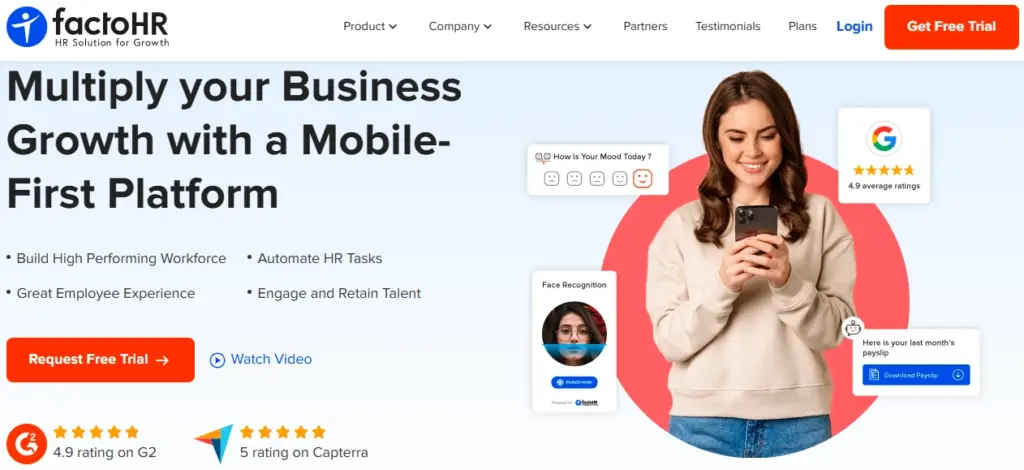
Key Features:
- Geo-fencing and GPS tracking
- Mobile-based attendance
- Shift & roster management
- Integration with payroll
Pros:
- Great for businesses with field workers
- Great mobile app
- Customizable attendance flows
Cons:
- Can be daunting with too many features
- Reporting UI can be more intuitive
Key Features to Watch Out For
While comparing an attendance management system, businesses need to thoroughly examine the features that the tool has to offer. The ideal tool is not only for tracking time, it should be integrated into your whole HR infrastructure. These are the key features to find:
1. Biometric & Digital Attendance
Biometric scanners, RFID cards, and facial recognition ensure that attendance is accurate and tamper-proof. For remote and hybrid teams, mobile-based check-ins, QR codes, and GPS-based geo-fencing are equally important.
2. Seamless Payroll Integration
One thing that is a necessity for businesses is attendance and payroll software integration. It guarantees that working hours, leaves, and overtime are calculated directly in payroll, eliminating errors and saving innumerable hours of manual reconciliation.
3. Shift and Roster Management
Businesses frequently have multiple shifts across different locations. A good employee attendance management system enables you to generate rosters, allocate shifts, and control overtime without any confusion.
4. Cloud-Based Access & Mobility
With enterprise time and attendance software, cloud access becomes a must. This enables employees and managers to login from anywhere, view their records, and make updates on the move.
5. Employee Self-Service Portal
Employees today want independence. Through a self-service portal, they can request leave, monitor balances, view attendance history, or download timesheets independent of HR.
6. Real-Time Analytics & Reporting
Insights based on data assist the HR and management in identifying trends such as absenteeism, overtime misuse, or productivity deficits. Attending software should have customizable dashboards and downloadable reports.
7. Compliance Management
Labor laws and overtime policies vary between states and nations. A robust system should have audit-ready attendance records and should maintain adherence to workplace regulations.
8. Integration with HRMS & ERP
Many organizations have numerous systems. Selecting an HRMS attendance platform that integrates with HR, payroll, accounting, and ERP makes processes less painful.
9. Scalability & Customization
As the staff increases, the attendance management software must scale with the company. It must also support policy customization because each business has its own attendance rules.
Advantages of Attendance Management Software for Enterprise
Adopting a modern attendance management system is not just about convenience, it has a direct impact on productivity, compliance, and employee satisfaction. Let’s look at the benefits in detail:
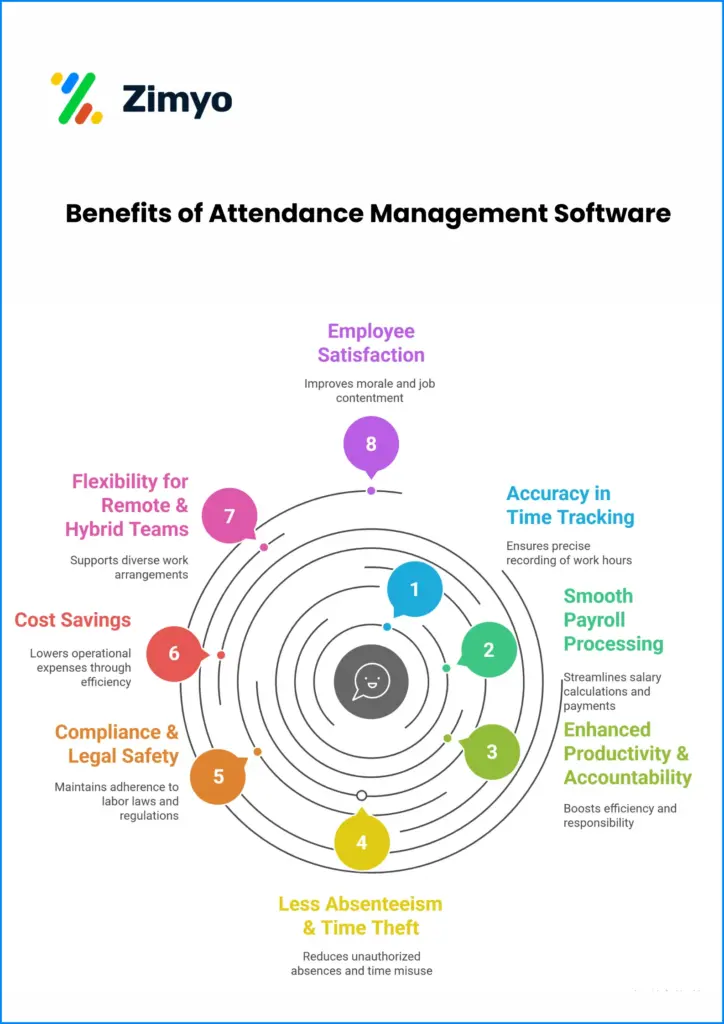
1. Accuracy in Time Tracking
Manual attendance is subject to human error. Automated employee timesheet software guarantees accurate recording of work hours, overtime, and breaks, which results in equitable payroll processing.
2. Smooth Payroll Processing
Organizations spend hours of administration when payroll attendance software is not utilized. Because attendance is automatically integrated with payroll, salaries are accurate and timely.
3. Enhanced Productivity & Accountability
When the employees know their time is being monitored openly, accountability enhances. The managers can simply monitor attendance patterns, identify frequent absentees, and decrease productivity loss.
4. Less Absenteeism & Time Theft
Biometric verifications, geo-fencing, and automated reporting functionalities eliminate “buddy punching” (employees clocking in on behalf of other employees) and minimize absenteeism.
5. Compliance & Legal Safety
Businesses are required to be compliant with labor legislation, working hour restrictions, and overtime pay. Enterprise time and attendance software maintains history audit-ready, saving businesses from legal fines.
6. Cost Savings
Automation eliminates administrative expenses, payroll inaccuracies, and unauthorized overtime, resulting in substantial cost savings for businesses.
7. Flexibility for Remote & Hybrid Teams
With mobile apps, GPS check-ins, and cloud-based systems, employees can mark attendance even while working remotely, making it ideal for modern work models.
8. Employee Satisfaction
Employees appreciate transparency. Having access to an employee attendance management system where they can see their records, request changes, or apply for leave increases trust and satisfaction.
How to Choose the Best Attendance Software
With so many options in the market, choosing the best attendance software for your enterprise can feel overwhelming. Here’s a step-by-step guide to make the decision easier:
1. Understand Your Workforce Needs
- Do you have remote or field employees? → Look for GPS tracking and mobile clock-ins.
- You run 24/7 operations? → Choose software with multi-shift and overtime support.
- Does you manage large teams across locations? → Pick a scalable enterprise time and attendance software.
2. Check Integration Capabilities
Your attendance management system should integrate smoothly with payroll, HRMS, and ERP. Without this, HR teams will waste time transferring data manually.
3. Evaluate User Experience
Complex systems are often underutilized. Choose attendance software with an easy interface so employees and managers can use it without heavy training.
4. Prioritize Compliance & Reporting
Ensure the tool can generate compliance-ready reports, audit logs, and government-mandated registers to avoid penalties.
5. Look for Scalability
Companies expand over time. The employee attendance system you select should scale with new employees, departments, and offices.
6. Consider Security & Data Privacy
Attendance data is sensitive. Pick a solution that offers encryption, role-based access, and GDPR/ISO compliance.
7. Compare Costs vs. Features
Inexpensive is not always optimal. Rather, look to ROI – select software that minimizes manual errors, saves time in HR, and increases workforce productivity.
8. Test Before You Buy
Always request a demo or trial. This helps your HR team and employees experience the software firsthand before committing.
What Else Zimyo Offers
Zimyo goes far beyond being just an attendance management software—it positions itself as a full-fledged HRMS / HCM (Human Capital Management) platform. It offers a wide range of modules designed to simplify HR operations, boost productivity, and enhance the overall employee experience.
Module / Domain | Core Features & Capabilities | Value for Enterprises |
Payroll & Compensation | Automated payroll processing, compliance-ready calculations, multi-entity payroll, direct bank integration, instant payouts | Eliminates payroll errors, ensures legal compliance, accelerates salary disbursement |
Core HR / Administration | Centralized employee records, organization hierarchy, document storage, policy management, onboarding & exit workflows | Streamlines HR administration, reduces manual effort, and eliminates data silos |
Leave & Time-Off Management | Custom leave policies, multi-level approvals, real-time leave balances, leave encashment | Smooth processing of leave requests with seamless integration into attendance & payroll |
Performance & Talent Management | OKR & KPI tracking, 360° feedback, continuous evaluations, appraisal workflows, normalization | Aligns employee performance with company goals, drives accountability, aids promotions |
Recruitment & Applicant Tracking (ATS) | Candidate database, resume parsing, interview scheduling, configurable hiring workflows, sourcing integrations | Speeds up hiring cycles, strengthens talent pipelines, improves recruitment efficiency |
Employee Engagement & Experience | Pulse surveys, peer communication, announcements, discussion forums, helpdesk, happiness index, anonymous feedback | Enhances workplace culture, keeps employees engaged, and boosts retention |
Training modules, online courses, certifications, learning progress tracking | Promotes upskilling and continuous employee growth within the organization | |
Expense & Claims Management | Easy claim submission, multi-level approvals, integration with payroll reimbursements | Simplifies expense tracking and ensures faster reimbursements |
Shift & Workforce Scheduling | Shift templates, rotational scheduling, roster management, shift swaps | Improves workforce planning, especially for frontline or manufacturing teams |
Geofencing & Field Tracking | GPS-enabled attendance, real-time location tracking, offline check-ins, travel tracking | Provides transparency and accountability for remote and field-based employees |
Reports & Analytics | Custom reports, dashboards, workforce trends, performance & attendance analytics | Helps HR leaders make smarter, data-driven decisions |
Security & Compliance | Role-based access, audit trails, encryption, GDPR compliance, multi-entity setup | Ensures data privacy, strengthens internal controls, and maintains legal compliance |
Conclusion
Attendance management is no longer a mere marking of presence anymore. For businesses, it’s about precision, efficiency, compliance, and trust by employees. Whether you require biometric integration, GPS tracking, or payroll automation in its entirety, the correct attendance management software can revolutionize the way you manage your workforce.
Among all the tools enumerated, Zimyo is the standout with its easy-to-use interface, robust payroll integration, and full-fledged HRMS suite – making it among the best attendance software solutions for businesses.
You invest in the right employee attendance management system today and save yourself time, costs, and compliance risks tomorrow.
FAQs
Which software is best for an attendance management system?
Zimyo is the best attendance management system, offering biometric & geofencing, real-time tracking, leave integration, and payroll sync.
What is the best time and attendance software?
Zimyo is the best time and attendance software for enterprises, combining accurate time tracking, shift scheduling, and payroll integration.
Which attendance app is best for small businesses?
Zimyo provides the best attendance app for small businesses with mobile check-ins, geofencing, automated timesheets, and easy payroll sync.
What is the best time tracking software for small businesses?
Zimyo is the best time tracking software for small businesses, offering mobile accessibility, overtime tracking, and simplified payroll integration.



